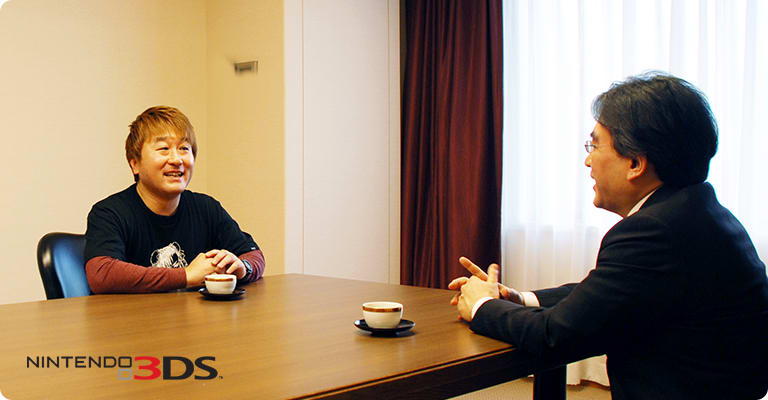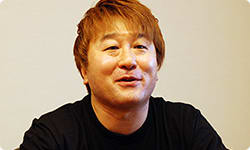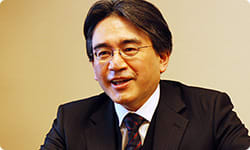Never Stop Communication
The one thing I want to spend time creating with the Nintendo 3DS system is the community. We released two versions on home consoles, and the one thing I've continued to say is, "Always continue to make a community for the people here, here and here." I don't mean just sales and advertisements. In order to have people actually enjoy the act of "fighting," they can start off by playing each other face to face. There, they'll realize something and say, "Yeah, I remember this feeling." If we manage to get that far, the people around that player will start getting into it, too.
Yes. It's like when a close friend comes up to you and says, "Let's play it." That person is bound to pick up the controller.
Yes. I am starting to realize that taking care of that kind of community is very important, no matter what game it is. So, how can we develop that kind of community? On the HD home consoles, it's to make it so that once the player inserts the disc he or she will never leave the community. That's why, when they return to the menu screen, they can see what's happening in the entire community just through the game console.
So, that's why you implemented Channel Live (Spectator Mode) and Voice Chat features for the players who aren't actually fighting.
Yes. With an improved network functionality that the Nintendo 3DS system has, registering friend codes from Nintendo will allow you to form a community no matter how far apart you are. Let's say Capcom wanted to suggest doing something in America. If there are communities all over the place, everyone may come together. They may also bring along their friends, girlfriends and even their teenage kids. That alone will create yet another large community. I think those methods of game creation and the communities are the two mainstays for having fighting games reintroduced to the markets.
At one point, fighting games were engaged in fierce battles each other, but it seemed they had reached a dead end in its evolution path. The number of players had dropped off significantly. But with Street Fighter, I think that has changed. Nintendo had taken the stance of "increasing the gamer population." We wondered why the consumers who used to play no longer were. We had to understand the reason and try to remove the barriers to get them to pick up an interest once more. We thought we'd be able to change the situation that way. When I heard about your approach today, I think it's very similar to ours.
I think so, too. Some might describe it as just a matter of efficiency, but I think it's really important to get through to people.
Yes. You can't really describe communicating with your consumers as just "increasing efficiency." If I was a consumer, I wouldn't want to be a part of that efficiency to receive their messages. No one would feel welcome that way.
Yes. When dealing with the consumers as a worker, you always have to put yourself in their shoes. For example, if you were at a restaurant and asked for water, wouldn't you be mad if they said, "I don't want to bother myself to bring it to you, so I want everyone there to pass it around." (laughs) A better way to do it is like having a particular leaflet for this person or having a particular display for that person. Depending on how considerate we are to others, I believe it'll increase the opportunities for us to be noticed.
That's very interesting! Generally speaking, games made for hardcore gamers don't take that approach at all. For example, your Super Street Fighter IV 3D Edition has the feature of "being able to use special attacks with just a tap on the touch screen." Some might even feel that's a "leeway feature."
I agree. (laughs)
When Nintendo made New Super Mario Bros. Wii,27 we made a system called the Super Guide28 for people who just couldn't pass a stage. We received criticism that it's an "easy mode that beats the game for you." Your situation is identical, I think.
27. New Super Mario Bros.™ Wii: An action game released for the Wii™ console in December 2009.
28. Super Guide: When a player dies eight times in a row on a single course, the computer will control Luigi to guide the player on how to beat the course.
Of course, they don't have to use the touch screen. We have stages for consumers who'd actually prefer that. But if we can get people to say, "That looks like fun! I should try it," it would definitely increase the player population. If you're the top player, wouldn't it feel better if you're ranked high among lots and lots of people?
Yes. By getting more participants for Super Mario through Super Guide, they might understand how amazing it is to beat the game without using it even once. If more people become like that, I think it will increase the value of being able to play a game very well.
You're exactly right. That's definitely going to be talked about more: building the community even more. Coming from me, some people say I'm a sellout, but I believe game production is a service industry. We have to watch how we provide things and also take into account how people receive them.
We're doing things to get the consumers to like it. If there are fewer people who play, it'll certainly be less worthwhile, too. That's why, if we can get as many people to understand our values and to have fun in the process, I think more players will sympathize with that feeling. In the end, it'll provide a better future for us, too.
Yes. In recent years, the diversity and age range of the consumers have continued to expand. At the very least, there seems to be fewer and fewer people who have zero interest in video games. So, how do we get them to go back to games? We have to try to fill in the gaps of what's sucking away at their interest. I don't believe that thinking about that conflicts with game creation or creativity.
Yes.
So, for example, to figure out what piques people's interest in Europe, we don't have to brown-nose people or change the fundamental play nature of the games. We just have to provide something "people can get excited about." This is something we all have to think about. Ever since the failure with Shadow of Rome, this has been the foundation for me in terms of creativity.


